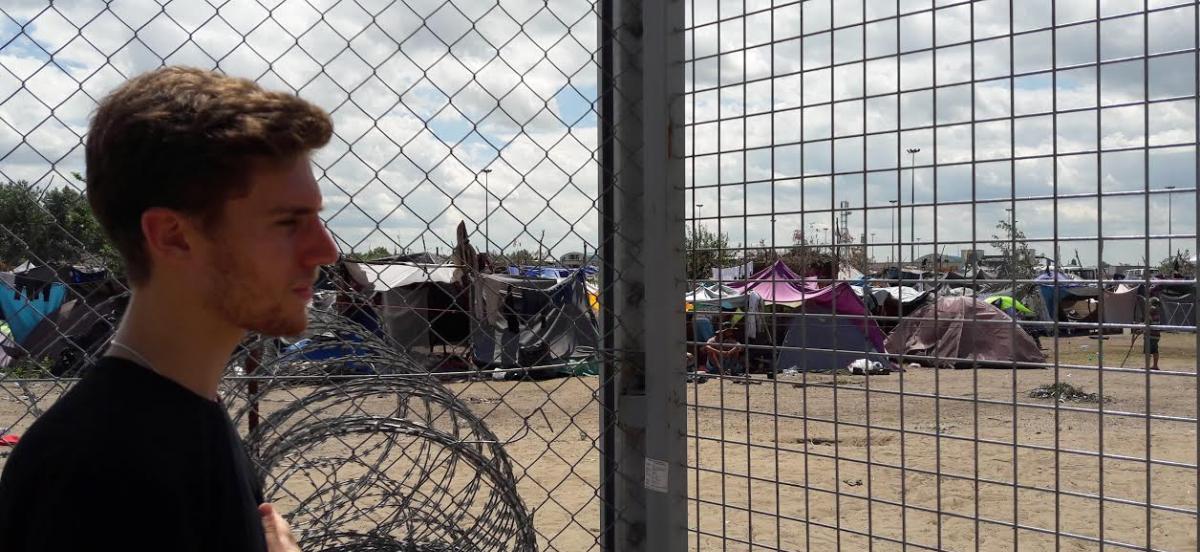Summer Centered: Julian Schneider ‘17 Helps at Hungarian Refugee Camps

Julian Schneider '17 looking across a militarized fence, which forms the Hungarian-Serbian border, during a visit to a refugee camp with no electricity or running water on the Serbian side. Serbia constitutes the external border of the Shenghen zone and, as such, does not provide refugee status or integration services.
Details
The philosophy and political science major works directly with displaced people and has proposed an initiative to coordinate related NGOs as part of his internship with Menedék - Hungarian Association for Migrants.
This summer, the European refugee crisis is more than a collection of headlines for Julian Schneider ‘17. Thanks to funding from the Center for Peace and Global Citizenship, he is in Budapest interning with Menedék - Hungarian Association for Migrants, a non-governmental organization (NGO) that promotes social integration of immigrants in Hungary. As such, it provides a wide range of services, from psycho-social counseling for asylum-seekers to educational and cultural projects for the public.
“Although with 63 million refugees and internally displaced people across the globe it might seem like this is a problem too big to solve, when you're on the ground, it becomes quickly apparent how the smallest things can make significant differences for individual people,” Schneider says. “And that is a powerfully motivating force in my work here.”
Earning this unique summer work opportunity wasn’t easy for Schneider. Menedék doesn’t offer a formal internship program, but after showing his unyielding interest and passion for the subject, Schneider was finally interviewed and offered a position with the organization. He is now working primarily in three refugee camps—Bicske, Vámosszabadi, and Fót. Except at Fót, an open camp where unaccompanied minors often make a run for Western Europe, it isn’t uncommon for the number of refugees in the camp to exceed its capacity dramatically, Schneider says.
After two days of work in the camps, where he usually assists in clasrooms and talks to families and social workers, Schneider spends the three remaining work days assisting with several projects in the office. Besides officially working as Menedék's correspondent for the EU Commission Skills2Work project, he has started a coordination initiative.
“Before I arrived, there was little coordination between the organizations working on refugee and migration issues in Hungary,” he says. “So, I wrote a project proposal for coordinating all the NGOs, and have been emailing with dozens of organizations to convince them to join the initiative. With their support, we will apply for The UN Refugee Agency funding to establish a formal website to coordinate the NGOs and streamline the process for refugee and migrants seeking assistance.”
Schneider also hopes to create a fundraising and integration plan for families who have already received a refugee status in Hungary. After the Hungarian government cut all government-sponsored integration services, refugee families have been plagued by homelessness and unemployment.
His experience with Menedék has convinced Schneider to postpone his law school plans to work in the field of refugee assistance after graduation. At Haverford, he majors in philosophy and political science, with a concentration in peace, justice and human rights, and he is planning to use what he has learned this summer in his upcoming senior thesis on refugee theory.
“[T]his project is supposed to provide the field experience necessary to write a nuanced and balanced thesis on a subject area that is highly technical, and constantly changing with a moving political and legal landscape,” Schneider says.
—Katya Konradova '19
"Summer Centered" is a series exploring our students’ Center-funded summer work.



